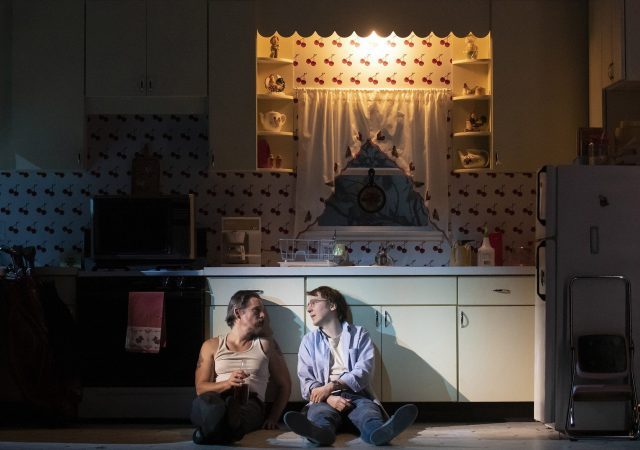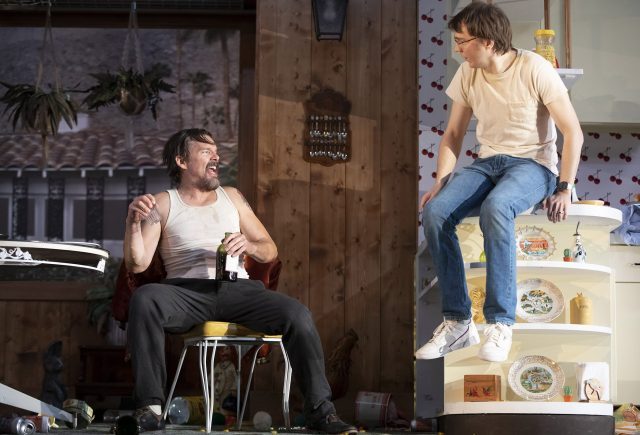
Ethan Hawke and Paul Dano star in Roundabout revival of Sam Shepard’s True West on Broadway (photo by Joan Marcus)
American Airlines Theatre
227 West 42nd St. between Broadway & Eighth Ave.
Tuesday – Sunday through March 17, $59-$352
212-719-1300
www.roundabouttheatre.org
Sam Shepard’s Pulitzer-nominated True West is an oft-produced star-driven 1980 vehicle that offers an epic sibling rivalry with a few parental complications as it deconstructs the American dream and the creation of film and theater itself. The two brothers, the younger Austin, a screenwriter with a wife and kids, and the older Lee, a ne’er-do-well thief and transient, have been played by such duos as Tommy Lee Jones and Peter Boyle, Gary Sinise and John Malkovich, Dennis Quaid and Randy Quaid, Kit Harington and Johnny Flynn, Bruce Willis and Chad Smith, Bob Hoskins and Antony Sher, and, in its Broadway debut in 2000, Philip Seymour Hoffman and John C. Reilly, who occasionally switched roles. The black comedy is now back on Broadway at the American Airlines Theatre in a ferociously funny Roundabout revival, directed by James Macdonald, with Paul Dano as Austin and Ethan Hawke as Lee. This new production benefits from close ties with Shepard, who died in 2017 at the age of seventy-three: Macdonald previously helmed such Shepard works as Fool for Love and Simpatico and directed Shepard in Caryl Churchill’s A Number, while Hawke has directed Shepard’s A Lie of the Mind and starred with Shepard in Michael Almereyda’s 2000 Hamlet, which featured Hawke as the title character and Shepard as the ghost of his father. Hawke also directed Dano in the New Group’s Things We Want in 2007.

Siblings Lee (Ethan Hawke) and Austin (Paul Dano) go at each other in Sam Shepard revival at American Airlines Theatre (photo by Joan Marcus)
A quiet, focused man, Austin is house-sitting their mother’s (Marylouise Burke) suburban home in Southern California. She is off in Alaska — essentially the polar opposite of Cali — and he is taking care of her plants while writing a screenplay that independent producer Saul Kimmer (Gary Wilmes) is interested in. The gruff, uncouth Lee shows up unexpectedly, claiming to have spent years in the desert and visiting with their father. Austin does not want Lee around for an upcoming meeting with Saul, but Lee not only interferes but is soon pitching his own film project, a contemporary Western based on his adventures on the road, pitting the two brothers against one another while they also consider working together. Macdonald, Hawke, and Dano play up the physical slapstick in this raucous version. “You probably think that I’m not fully able to comprehend somethin’ like that, huh?” the less-educated Lee asks. “Like what?” Austin responds. “That stuff yer doin’. That art. You know. Whatever you call it,” Lee replies, as Shepard, who represented manliness and masculine achievement during his lifetime as an actor, writer, and rancher, questions the very notion of storytelling. When they’re trying to outline the narrative, which Austin thinks is bad, Lee says, “What? It’s too what? It’s too real! That what ya’ mean, isn’t it? It’s too much like real life!” Austin answers, “It’s not like real life! It’s not enough like real life. Things don’t happen like that.”
In the second half of the play, the brothers basically switch places in a riotous swap of psyches and body movement. Even Mimi Lien’s long horizontal set, meant to evoke a widescreen movie, is divided in two, one side a kitchen, the other an alcove with plants and a table with a typewriter. The pairs of cherries on the wallpaper are a particularly deft touch, evoking testicles as well as how brothers are naturally stuck with each other. “I always wondered what’d be like to be you,” Lee admits, to which Austin explains, “And I used to say to myself, ‘Lee’s got the right idea. He’s out there in the world and here I am. What am I doing?” In True West, Shepard, who had the public persona of a rugged man’s man, a shining example of the American male, delves into the dual nature of identity and art, separating who we are from who we want to be, what’s real from what’s fantasy. California is home to Hollywood, the ultimate myth maker, as well as the empty desert and vast landscapes where cowboys roam the land. While Austin writes about romance, we never learn anything about his relationship with his family; the only things that exist for him are written on pages. Lee is living a rough-and-tumble life but suddenly wants to slow down and set it down on paper. It is as if they are enacting the two sides of Shepard himself. All hell breaks loose at the conclusion, which is as hysterical as it is horrifying, leaving you both exhausted and exhilarated, exploring the mythology of your own identity and family bonds.